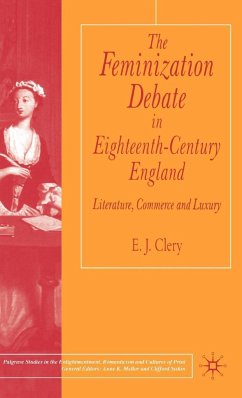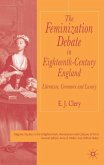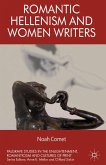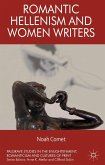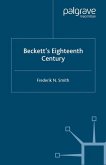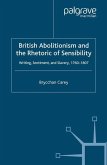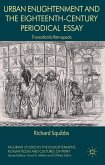In the Eighteenth-century, critics of capitalism denounced the growth of luxury and effeminacy; supporters applauded the increase of refinement and the improved status of women. This pioneering study explores the way the association of commerce and femininity permeated cultural production. It looks at the first use of a female author as an icon of modernity in the Athenian Mercury , and reappraises works by Elizabeth Singer Rowe, Mandeville, Defoe, Pope and Elizabeth Carter. Samuel Richardson's novels represent the culmination of the English debate, while contemporary essays by David Hume move towards a fully-fledged enlightenment theory of feminization.
'The Feminization Debate in Eighteenth-Century England is an elegantly written, trenchant and persuasive analysis of how the category of the feminine was used in order to chart economic growth and to assess its impact on the social fabric of England. Particularly in the Introduction, Clery provides a useful overview of historical and literary scholarship of the period and throughout she illuminates the study of feminism in general and its English history in particular by showing how discourses of the feminine were largely (though not exclusively) about masculinity, virtue, and authority in an emerging commercial economy. This consistently original and provocative study fulfils its promise to restore a sense of wonder to the early history of capitalism and in the process impressively inaugurates the 'Palgrave Studies in The Enlightenment, Romanticism and the Cultures of Print' series.' - Professor Claudia L. Johnson, Princeton University, USA
'E J Clery's intriguing book achieves a redefinition of the public sphere in England between the 1690s and 1750s.' - Julia Swindells, University College
'This is a very original book, both intelligent and informed; showing a sure mastery of the subject it addresses...' - Marialuisa Bignami, Modern Language Review
'This provocative, dense and economical book charts the way in which the figure of woman serves as a measure of commercial growth and historical change in Britain between the late seventeenth andthe mid-eighteenth century...[The book] argues its case with an energy that rivals the literary voices it invokes and has an ambition and conviction rarely found in current eighteenth-century scholarship too often content to assess local effects or describe coterie history.' - Ros Ballaster, Journal of European Studies
'...a learned, provocative book, one that not only puts forward a revisionary thesis, but illuminates it with wide-ranging and compelling examples...[a] strongly argued and highly fruitful study, which deserves a wide readership...' - Devoney Looser, The Eighteenth Century: Theory and Interpretation
'The Feminization Debate is an important book, notable for its willingness to consider literature and society in an economic context.' - Thomas K. Meier, The Age of Johnson
'Clery's work, like the best work of this decade and unlike much of the best work of the 1980s, historicizes before it theorizes...' - Cynthia Wall, 'Recent Studies in the Restoration and Eighteenth Century', Studies in English Literature 1500-1900
'This is a rewarding and fascinating book for those interested in Richardson, eighteenth-century female authors, and eighteenth-century cultural history.' - A. W. Lee, Choice
'Clery's study makes real contributions to ongoing discussions regarding gender and sexuality during the British Enlightenment, and it deserves the attention of literary critics and social scientists alike.'- Paul Kelleher, Journalof The History of Sexuality
'E J Clery's intriguing book achieves a redefinition of the public sphere in England between the 1690s and 1750s.' - Julia Swindells, University College
'This is a very original book, both intelligent and informed; showing a sure mastery of the subject it addresses...' - Marialuisa Bignami, Modern Language Review
'This provocative, dense and economical book charts the way in which the figure of woman serves as a measure of commercial growth and historical change in Britain between the late seventeenth andthe mid-eighteenth century...[The book] argues its case with an energy that rivals the literary voices it invokes and has an ambition and conviction rarely found in current eighteenth-century scholarship too often content to assess local effects or describe coterie history.' - Ros Ballaster, Journal of European Studies
'...a learned, provocative book, one that not only puts forward a revisionary thesis, but illuminates it with wide-ranging and compelling examples...[a] strongly argued and highly fruitful study, which deserves a wide readership...' - Devoney Looser, The Eighteenth Century: Theory and Interpretation
'The Feminization Debate is an important book, notable for its willingness to consider literature and society in an economic context.' - Thomas K. Meier, The Age of Johnson
'Clery's work, like the best work of this decade and unlike much of the best work of the 1980s, historicizes before it theorizes...' - Cynthia Wall, 'Recent Studies in the Restoration and Eighteenth Century', Studies in English Literature 1500-1900
'This is a rewarding and fascinating book for those interested in Richardson, eighteenth-century female authors, and eighteenth-century cultural history.' - A. W. Lee, Choice
'Clery's study makes real contributions to ongoing discussions regarding gender and sexuality during the British Enlightenment, and it deserves the attention of literary critics and social scientists alike.'- Paul Kelleher, Journalof The History of Sexuality

